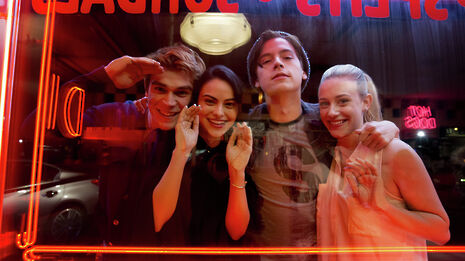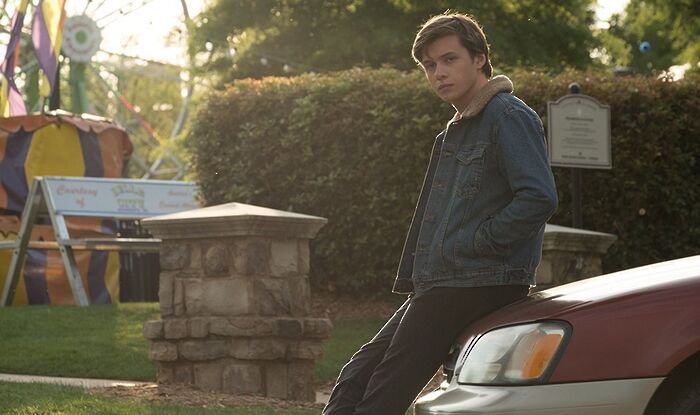Guilty Pleasures: Riverdale is great, and here’s why
Zoe Black uses one of her favourite ‘trash’ television shows to reflect on the wider importance of distractive media

The term ‘guilty pleasure’ has been a source of bother to me since the age of eleven, when I used to read the section of the same name in the Metro. ‘Guilty pleasures’ covered celebrity news and gossip, but I never felt even remotely guilty about relishing those four pages during my commute to school each morning, always gleefully ignoring the latest political scandal which adorned the front cover. As a pre-teen who barely knew who Justin Timberlake even was, there was something arresting and delicious about absorbing strange factoids and updates about glossy, troubled stars. While I appreciated that it was a distraction with little intellectual merit, I also knew on a fundamental level that distraction was a necessary respite, and that I certainly was not going to get it from my LG Cookie, even if it was baby pink.
Today, the Netflix Original Riverdale answers that need. It is what many might term ‘trash TV’, but I am frustrated at how such a flippant phrase negates the need to discuss why so many people find shows such as Riverdale fulfilling viewing experiences. I want to make the case for why Riverdale stands out as an example of the so-called guilty pleasure, epitomising and justifying the genre.
Why not be distracted and have a good time while you’re at it?
The show is set up as a murder mystery in a small town, and the angle is that the protagonists are high schoolers with all manner of stereotypical teen problems. Riverdale is riddled with daddy issues, repressed emotions, ridiculous fashion statements, fraught friendships, sexual tension etc., but as a viewer you permit yourself to indulge in all the pettiness and drama because of the self-awareness of the characters. When a white boy writes songs for a black girl band the situation is acknowledged as problematic, whilst the show’s narrator (does anyone else miss fourth walls?) self-identifies as a lone-wolf archetype.
Of course, this self-awareness does not actually make up for the fact that all of the four protagonists are white, or that the main LGBT character only appears when necessary for the plot, but it is easy to appreciate baby steps in increased representation when so much of our media offers so painfully little. On the whole, it is distinctly a product of the second half of the 2010s, and this provides the same brand of satisfaction that those pages of Metro did back in the early 2010s when I knew that Cher Lloyd’s relevance would have a very quick sell-by date. The very ephemerality of the enjoyment offered is key to the appeal of guilty pleasures.
Riverdale revels in high school tropes and dramatics, but the overarching thriller narrative keeps the plot and the characters progressing, and it means that the show stands a shoulder above similar teen-oriented or reality TV shows. While RuPaul and Hell’s Kitchen form a significant chunk of my ‘guilty pleasure’ viewings, their unfortunate basis in reality means that their capacity for artistic licence is sadly limited. Conversely, the fiction of Riverdale provides ample opportunity for moody lighting, bizarre dyed hair that has significance for the plot, architecture which reflects, augments or conceals personalities, and so much more. It creates the same context for shit-talking and debate that reality TV does, while also being a valid subject for art criticism, if that floats your boat.
To be encouraged to acknowledge tropes in a TV show that is itself an unashamed embodiment of the tropiness of TV is a rarity: Riverdale is thus a guilty pleasure with depth and a piece of art which can be enjoyed on many interconnected levels. Nevertheless, the depth of a guilty pleasure ought not merely refer to its intellectuality, although watching TV through this lens is of course forgivable, if not perhaps entirely advisable. Rather, guilty pleasures fulfil the important role of distraction in our lives; a life lived without reprieve from everyday stress is obviously less productive and happy.
What ‘guilty pleasures’ or ‘trash TV’ ultimately seem to signify are media which appeal to our desire for pure and simple entertainment. However, the terms we use to refer to this genre or mode of work deny our right to openly analyse and enjoy it. To mock a form of distraction for its apparent lack of real-world relevance or educational properties is to miss the point entirely: the need for distraction is one we all feel, so why not be distracted and have a good time while you’re at it? For all you who are too cool to like Riverdale or some other guilt-inducing pastime, I banish you to the cold abstractions of sudoku and crosswords. I hope you have as much fun as I do.
 News / Eight Cambridge researchers awarded €17m in ERC research grants27 December 2025
News / Eight Cambridge researchers awarded €17m in ERC research grants27 December 2025 News / Downing investigates ‘mysterious’ underground burial vault 29 December 2025
News / Downing investigates ‘mysterious’ underground burial vault 29 December 2025 Lifestyle / Ask Auntie Alice29 December 2025
Lifestyle / Ask Auntie Alice29 December 2025 Sport / Hard work, heartbreak and hope: international gymnast Maddie Marshall’s journey 29 December 2025
Sport / Hard work, heartbreak and hope: international gymnast Maddie Marshall’s journey 29 December 2025 Interviews / Meet Juan Michel, Cambridge’s multilingual musician29 December 2025
Interviews / Meet Juan Michel, Cambridge’s multilingual musician29 December 2025










